Henry Kissinger dies at 100 in Kent
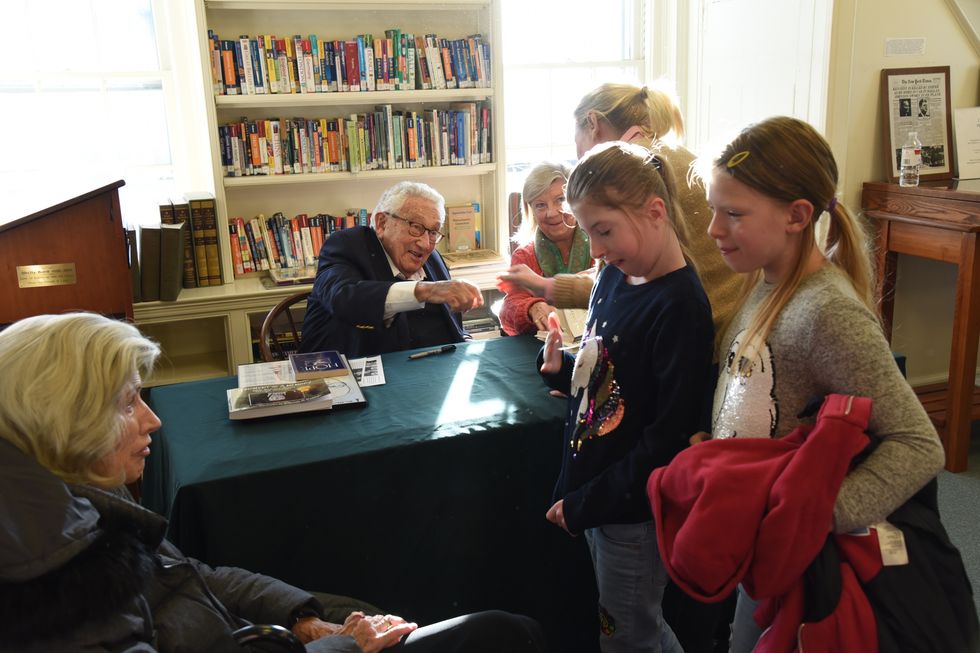
Henry Kissinger signing books in the Kent Memorial Library.
Photo by Lans Christensen

KENT — Henry Kissinger, 100, one of the most controversial figures of the latter half of the 20th century, died at his Kent home Wednesday, Nov. 29, according to a statement from his consulting firm, Kissinger Associates.
The statement said: “He will be interred at a private family service. At a later date there will be a memorial service in New York City.”
He is survived by his wife, Nancy (Maginnes) Kissinger; two children: David and Elizabeth; and five grandchildren.
Kissinger had made a home in Kent since the early 1980s, when he bought the Henderson Blueberry Farm on Henderson Road. He was active in diplomatic circles until the end of his long life, and it was there he met with Chinese Ambassador to the United States Xie Feng on May 26 of this year, the day before his 100th birthday. The pair reportedly had an in-depth exchange of views on China/U.S. relations, and international and regional issues of common interest.
In July, Kissinger traveled to China where he met President Xi Jinping and other Chinese leaders in Beijing.
Despite his larger-than-life impact on the world stage, Kissinger engaged with his fellow townspeople. He supported the Kent Volunteer Fire Department and attended its carnival every year that he was able, where he and his wife would stop for a grinder at the Rod and Gun Club booth before going on to the bingo tent to play with family, employees, and friends such as the late designer Oscar de la Renta.
A good friend of Dolph and Audrey Traymon, he would often broadcast interviews from the Traymons’ Victorian house on Main Street and dine at their restaurant, the Fife ’n Drum.
Early in his Kent residency, he even used his vaunted diplomatic skills to smooth over a local kerfuffle over blueberries growing on his property. There was an outcry from the community about the destruction of the blueberry bushes that had a been a staple of Pick-Your-Own in Kent for years. Kissinger donated the blueberry bushes to Kent School, and they were planted at the girls school campus atop Skiff Mountain, now Marvelwood School. Kent residents have had free access to the bushes ever since.
Earlier in the 2000s, he participated in a program on Russia presented by the Kent Informal Club and the Kent Memorial Library.
Ken Cooper, then-president of the library board, knew the Kissingers well. “There is so much to say [about him],” Cooper said. “Those of us in Kent saw a different side of Dr. Kissinger as a regular, normal presence in our community. He was a regular guy and very gracious to everyone. He was very supportive of the land trust, the library and the fire department. He loved nature and pets — his dog ate supper at the table with him every night.
“When we started the lecture series,” Cooper continued, “he was instrumental in bringing major international figures to speak in Kent. One of striking things I remember is that we were very honored when [civil rights leader] John Lewis came to speak. We had a dinner for him the evening before, and we invited Dr. Kissinger and Nancy to attend. Dr. Kissinger stood up in the middle of the dinner and raise his glass in a toast to John Lewis. He said, ‘You are a Democrat, and I am a Republican, but I want you to know that we are deeply indebted as a country, and I am indebted as a citizen, for your contribution to civil rights in our country.’ I thought that was a very magnanimous thing to do.”
Cooper noted that Kissinger and his wife were a team. “Nancy and Henry were a team, they would finish each other’s sentences,” he said. “They were very affectionate, very fond and respectful of each other. And they made sure they shared credit for anything they did.”
But his time in Kent was just a homely backdrop to his career in what has been termed “the most powerful secretary of state of the post-war era.” His complicated legacy still resonates in this nation’s relations with China, Russia and the Middle East. Kissinger engineered opening relations between China and the United States during the Nixon administration, negotiated America’s withdrawal from Vietnam and a détente with the Soviet Union at the height of the Cold War.
In the 1970s, Kissinger, who described power as an aphrodisiac, was second in power only to President Richard M. Nixon, having joined the Nixon White House in January 1969 as national security adviser and later serving as secretary of state. When Nixon resigned, he stayed on under President Gerald Ford.
He advised 12 presidents, from John F. Kennedy to Joe Biden. His cunning and a ruthlessly practical approach to international relations caused him to be heralded by some and reviled by others. His secret negotiations with China led to Nixon’s most famous foreign policy achievement and was designed to isolate the Soviet Union. It set the stage for today’s complex and sometimes fraught relationship between the two dominant economies. He was the only American to deal with every Chinese leader from Mao to Xi.
His involvement in the United States’ role in Vietnam was deeply divisive. Reportedly never persuaded the United States could win the guerrilla war, he nevertheless guided the Nixon administration in some of its most controversial moves. He was accused of breaking international law by authorizing the secret carpet-bombing of Cambodia in 1969-’70, an action against a neutral nation designed to root out the pro-Communist Vietcong forces operating across the border. The indiscriminate bombing killed 50,000 civilians.
He was known to quip: “The illegal we do immediately. The unconstitutional takes a little longer.”
He negotiated the Paris
Peace Accords that ended American involvement in Vietnam, calling it “peace with honor,” and was awarded the 1973 Noble Peace Prize for his role, but critics argued he could have made the same deal years earlier, saving thousands of lives.
He was the architect of the Nixon administration’s efforts to topple Chile’s democratically elected Socialist president, Salvador Allende. And when Pakistan’s U.S.-backed military was waging a genocidal war in East Pakistan [now Bangladesh] in 1971, he and Nixon ignored pleas to stop the massacre and approved weapons shipments to Pakistan, whose president served as a conduit for Kissinger’s courtship of China. At least 300,000 people were killed in East Pakistan and 10 million refugees were driven into India.
Once an advocate of limited nuclear war, he later reversed his opinion, conceding it might not be possible to contain escalation. By the end of his life, he had embraced the effort to gradually eliminate all nuclear weapons and, at age 95, began to warn against weapons controlled by artificial intelligence.
Courtesy of the Kent Good Times Dispatch, Kentgtd.org
Kissinger was born Heinz Alfred Kissinger to Louis and Paula (Stern) of Fürth, Bavaria, on May 27, 1923. His father lost his job in 1935 when the Nuremberg Laws forbade Jews from teaching in state schools. For three years, Paula Kissinger sought a way to get the family out of the country and, in 1938, the family was allowed to leave Germany when Kissinger was 15. When war broke out, at least 13 of the family’s close relatives died in concentration camps.
The Kissingers settled in Washington Heights, then a haven for German Jewish refugees. His father got a job as a bookkeeper but never fully adjusted to his adopted land. Kissinger dropped the Germanic “Heinz” in high school and adopted the name Henry. In 1940, he enrolled in City College, excelling in his classes, before being drafted by the Army in 1943.
The Army and the war were transformative for the young soldier. He heard a talk about the “moral and political stakes of the war,” and it reportedly changed the direction of his life. He served in Germany as a translator and, in the last months of the war, interrogated captured Gestapo officers and read their mail. He received a Bronze Star for his participation in efforts to uncover sabotage campaigns against American forces.
After the war, Kissinger remained in Germany as a civilian instructor teaching American officers how to uncover former Nazi officers, work that allowed him to crisscross the country. He was alarmed by what he saw as Communist subversion of Germany.
He returned to the United States in 1947 to resume his college education, entering Harvard as a sophomore. He remained at that august institution for two decades, finding fame as a professor before the divisiveness of the Vietnam War drove a wedge so sharply between him and his colleagues he vowed never to return.
Kissinger graduated summa cum laude in 1950, and with the Korean War underway, accepted consulting work for the government that took him to Japan and South Korea. He returned to Harvard to earn a Ph.D. and he and political science professor William Elliott started the Harvard International Seminar, a network that produced a number of leaders in world affairs.
Mr. Kissinger received his Ph.D. in 1954 and Kissinger joined an elite study group at the Council on Foreign Relations, whose mission was to study the impact of nuclear weapons on foreign policy. It was there that he produced his first book, a bestseller titled “Nuclear Weapons and Foreign Policy.”
In it, he argued that if an American president is paralyzed by fear of escalation, the concept of nuclear deterrence will fail. Many scholars panned the book, believing Kissinger had overestimated the nation’s ability to keep limited war limited; to this day scholars refer to it, looking for lessons to apply to cyberwarfare.
The success of the book led Kissinger back to Harvard as a lecturer. His classes were popular, but he was soon immersed in academic politics. He received tenure in 1959, announced by his old champion, Dean MacGeorge Bundy. By 1961 Bundy was national security adviser to John F. Kennedy, but Kissinger was unsuccessful in following him to the White House.
At this time, Kissinger renewed his friendship with Nelson Rockefeller, who then appeared to be a good presidential prospect for 1968. He also met a junior Rockefeller aid, Nancy Maginnes, whom he married years later. Kissinger had earlier married Anneliese “Ann” Fleischer in 1949. They had two children, Elizabeth and David, and divorced in 1964.
Kissinger wrote speeches for Rockefeller denouncing his Republican rival, Richard Nixon. But when Nixon won the nomination, Kissinger accepted an invitation to serve on Nixon’s foreign policy board. He was said to have used his own contacts to funnel information about Lyndon Baines Johnson’s Paris negotiations with the Vietnamese back to the Nixon campaign.
Whether he did or did not, Kissinger was on Nixon’s radar, and after the election, he was appointed national security adviser. Nixon directed Kissinger to run national security affairs from the White House, cutting out the State Department and Nixon’s own secretary of state, William P. Rogers. Kissinger consolidated his power, meeting often with Nixon, often without staff members present, laying the groundwork for his long and convoluted history as one of America’s premier architects of foreign policy.
Courtesy of the Kent Good Times Dispatch, Kentgtd.org
An overflow crowd packed Kent Town Hall on June 27 for a scheduled vote on a proposed wakesurfing ban on Lake Waramaug, prompting then–First Selectman Marty Lindenmayer to adjourn the meeting without a vote.
KENT —In 2025, Kent officials and residents spent much of the year navigating zoning disputes, regional policy issues and leadership changes that kept Town Hall at the center of community life.
The year opened with heightened tensions when a local dispute on Stone Fences Lane brought a long-running, home-based pottery studio before the Planning and Zoning Commission.
While some residents raised concerns about increased vehicle traffic associated with the studio, the commission ultimately reaffirmed the town’s support for cottage industries and the local arts community, bringing Alison Palmer Studios into zoning compliance in April through the approval of a conditioned special permit.
During deliberations, then–Vice Chair Karen Casey said she would be “terribly upset if we all of a sudden prohibit artists from living in their homes and doing their artwork,” calling such work “part of our culture here.”
In the spring, the town released the results of a community survey on recreational cannabis that had been circulated since December 2024. Sarah Chase, chair of the Cannabis Regulation Subcommittee, said the responses reflected a community that was “cautious but open-minded,” supportive of medical access, respectful of farming traditions, and focused on preserving Kent’s character.
The survey guided both the development of zoning regulations governing medical cannabis facilities and agricultural uses, and a ballot measure prohibiting the retail sale of recreational cannabis within town limits. Voters approved the ordinance banning retail on the Nov. 4 general election ballot.
The warmer months brought Kent into a high-profile regional dispute over wakesurfing on Lake Waramaug. After unprecedented turnout forced the postponement of a June vote, a proposed tri-town ban involving Kent, Washington, and Warren was approved decisively on July 31.
In Kent, 83% of voters supported the ban, which is scheduled to take effect in February. An opposition group subsequently filed an appeal, which remains under legal review.
Regional cooperation continued over the summer as Kent and New Milford joined forces to address resident concerns about large tour buses traveling along the narrow, winding South Kent Road en route to Club Getaway. Collaboration among the two towns, local residents, Club Getaway, and the state Department of Transportation ultimately resulted in a ban on large commercial buses along the road and nearby access routes.
During the summer, overcrowding at a popular swimming hole on North Kent Road prompted then–First Selectman Marty Lindenmayer to close the road until cooler autumn temperatures reduced the volume of visitors. Town officials and other stakeholders overseeing the site said they plan to work together over the winter to develop a long-term solution.
The fall brought discoveries that shed light on Kent’s past. At Good Hill Cemetery, a weathered headstone bearing a partially faded inscription memorializing two Revolutionary War–era sisters drew historians and puzzle-solvers eager to decipher its message.
Meanwhile, in Emery Park, Parks and Recreation Director Matt Busse partnered with the state archaeologist to survey the area for evidence of historic coal-worker settlements, uncovering a largely undocumented chapter of the park’s rugged history.
Also in Emery Park, town officials reviewed and accepted a bid to redevelop the long-defunct swimming pond, which has been closed for six years.
October brought lighter moments, as the Connecticut Antique Machinery Association hosted its popular Fall Fest and SPARK events, drawing residents of all ages. The month concluded with Halloween festivities on Main Street, where costumed revelers turned out in force for a contest judged by horror-rock icon Rob Zombie.
November marked a transition in town leadership. Eric Epstein was elected as the first selectman following Lindenmayer’s decision not to seek reelection. The month also saw the resignation of longtime Planning and Zoning Commission Chair Wes Wyrick, who stepped down after two decades of service. Karen Casey was elected to succeed him as chair in December.
The new officers have a full agenda in 2026. A longstanding zoning dispute with antique auto dealership Motoriot, centered on employee and inventory vehicle parking, continues following the issuance of a cease-and-desist order in November. A revised site plan is scheduled to go before P&Z on Jan. 8. Also slated for discussion is an application from substance-use disorder rehabilitation facility High Watch, which has stirred strong community response, and a zoning challenge tied to a proposed warehouse-to-residential conversion on Lane Street near downtown.
NORTH CANAAN — The past year was marked by several significant news events.
In January, the town honored Bunny McGuire for her decades of service to the community with the renaming of a park in her honor. The field, pavilion, playground and dog park on Main Street later received new signage to designate the area Bunny McGuire Park.
In February, Town Clerk Jean Jacquier stopped reporting to work amid a legal dispute, triggering months of uncertainty at Town Hall. Her prolonged absence became the focus of multiple court cases, heightened political tensions in town, and fueled debate in the lead-up to the municipal election. Following the election, Jacquier returned to her position and served through the remainder of her duly elected term.
In April, North Canaan Elementary School marked the 35th anniversary of its Arbor Day celebration, alongside the 55th anniversary of Earth Day, with the planting of a chinkapin oak as the newest addition to the school’s arboretum.
In May, the Becton, Dickinson and Company facility in North Canaan was evacuated after a hazmat scare. An employee identified a suspicious package, which resulted in a lock down and about 300 employees entered decontamination protocol, requiring them to leave clothing behind and shower before going home. The FBI transported the package from the facility to the state laboratory in Rocky Hill and all testing for active agents came back negative.
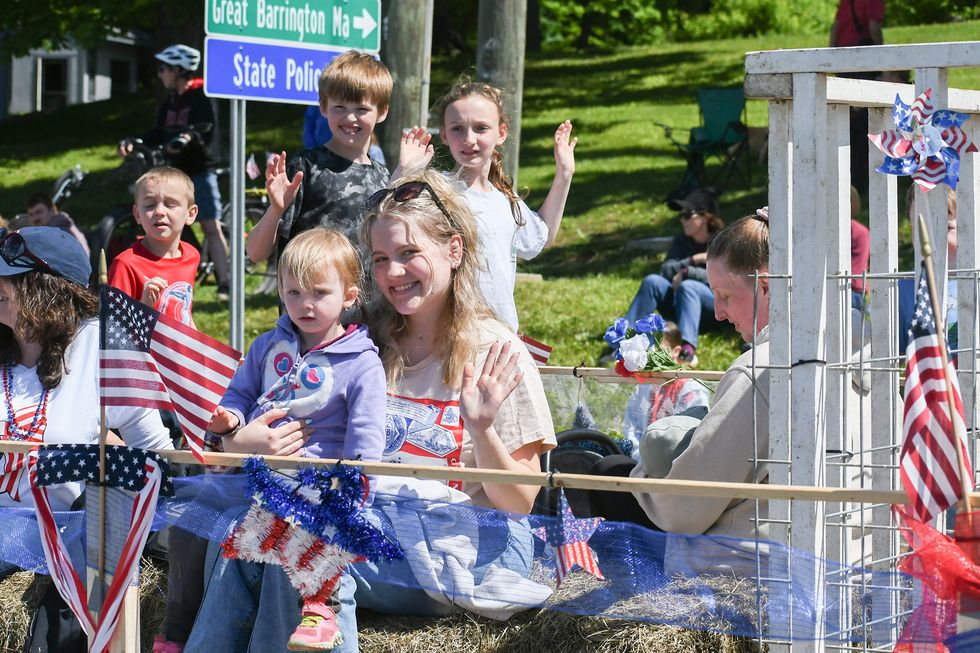
Memorial Day brought the community into town for a day of remembrance. The parade marched from Town Hall to the Doughboy statue, where residents gathered to pay respects to fallen members of the armed services.
Town commissions approved the construction of a new Dunkin’ location across from the Stop & Shop plaza on Main Street. The proposal calls for a roughly 2,000-square-foot rectangular building with 16 parking spaces and a drive-thru. Once the new site opens, the existing Dunkin’ inside the nearby gas station will close.
In July, Bunny McGuire Park was transformed into a carnival as community events unfolded across town, culminating in a parade and a grand fireworks display.
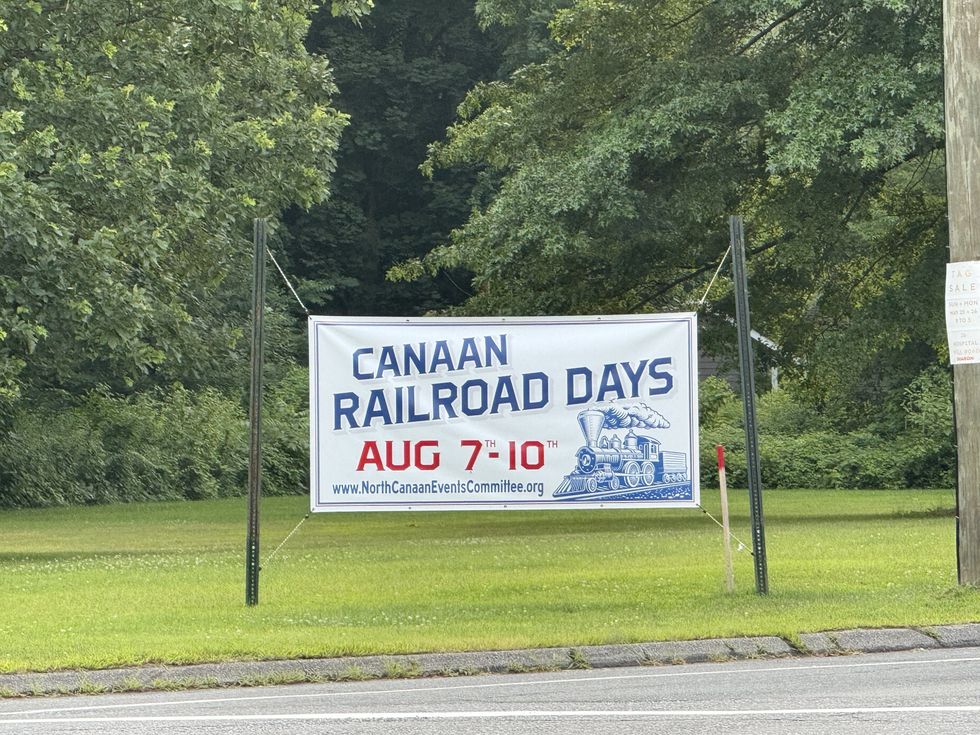
In August, Old Railroad Days made its debut, bringing the town’s rail heritage to life through four days of tours, exhibits and demonstrations. Throughout the celebration, Canaan Union Station pulsed with activity as residents and visitors gathered to take part.
At Geer Village, chef Gina Trivelli-Young opened Manna Catering in the café space formerly occupied by Railway Café. “A lot of my food is geared toward health, the nourishment of mind, body and soul,” said Trivelli-Young.
Geer also announced a “strategic partnership” with Integritus Healthcare, a 501 (c) 3 charitable organization and post-acute healthcare industry leader based out of Pittsfield. Integritus will become the management company for the Geer Village campus of services and Geer will remain the owner/operator of the programs and services, with Integritus Healthcare providing oversight.
New playground equipment was installed at NCES, which has been put to good use since school came back into session.
Douglas Library Director Norma DeMay announced her retirement from the role this year. “I’ve loved my job,” she said, full of praise for her staff and board members. “I love chatting with the people who come in. And you can’t beat a 9-minute commute.” DeMay was succeeded by Laura Moran.
Residents gathered at Colonial Theatre in October for the Canaan Foundation’s 25th anniversary, as well as a celebration of the town. The foundation was formed by a group of local citizens with a mission to enhance the quality of life for townspeople. This year a total of 24 grants were issued for a total of $28,500.
The Community Thanksgiving Dinner at the Pilgrim House provided nourishment and camaraderie for both guests and volunteers alike. Jeanine Coleman is a loyal server each year. “It’s my favorite time of year,” she said. “I love doing this.”
The Parade of Lights followed the weekend after Thanksgiving, which ushered in the holiday season. Cub Scouts donned their Santa Claus hats on Sunday, Dec. 7, at NCES to host a pancake breakfast with Santa.
The year was also marked by the election of a new first selectman, as challenger Jesse Bunce edged out incumbent Brian Ohler by two votes in a closely watched race.
In May, Cornwall residents gathered at the cemetery on Route 4 for a ceremony honoring local Revolutionary War veterans.
CORNWALL — The year 2025 was one of high spirits and strong connections in Cornwall.
January started on a sweet note with the annual New Year’s Day breakfast at the United Church of Christ’s Parish House. Volunteers served up fresh pancakes, sausage, juice, coffee and real maple syrup.
February brought a focus on housing, as legislators, local officials and affordable housing advocates gathered on a cold morning Feb. 7 on Town Street to celebrate the launch of a regional affordable housing program.
State Rep. Maria Horn, D-64, said, “What better than a cold, windy day to remind you of the importance of having a warm home,” she said.
Two new homes were completed later in the year on Town Street, and the Cornwall Housing Corporation invited the community to an open house celebration.
On the housing front, the Planning and Zoning Commission also worked throughout 2025 to address regulations that may have been restricting new home construction in town.
In March, a heroic effort by bystanders likely saved the life of a driver in a one-car accident on Route 7. The car had struck a utility pole and was surrounded by live wires when nearby residents rushed to help.
“The woman was pulled from the car with, by my estimate, 90 seconds to spare before the flames would have reached her,” said Kent Volunteer Fire Department Chief Alan Gawel.
Two of the responders, Niya Borst and Emil Urbanowicz, both students at Housatonic Valley Regional High School, were recognized in front of the student body. Borst said she and her aunt used a sledgehammer to break the rear window in an attempt to free the driver.
In April, Cornwall Consolidated School’s 7th graders completed a research project honoring Naomi Freeman, Cornwall’s first Black female landowner. As part of the project, a portion of Great Hollow Road was renamed for Freeman on an honorary basis.
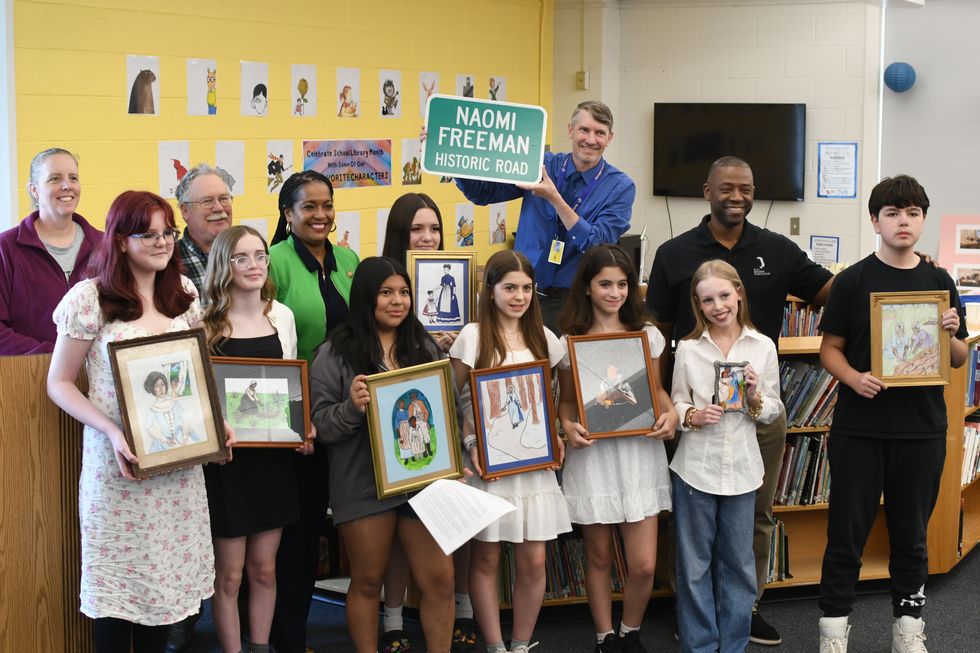
In May, Cornwall held a powerful ceremony to honor local veterans of the Revolutionary War and replaced 10 refurbished grave markers in the cemetery on Route 4.
Cornwall’s Manny Matsudaira earned valedictorian honors at HVRHS.
The Village Green was the destination for summer fun with July Fest, Taste of Cornwall in August and the Agricultural Fair in September.
In the fall, Cornwall Volunteer Fire Department launched a major fundraising campaign to replace two outdated firetrucks. The effort was a huge success and CVFD successfully met its goal of $600,000.
At the fire department’s open house in October, Resident Richard Schlesinger spoke of his experience being rescued by the volunteer ambulance corps after experiencing cardiac arrest about four years ago. “They saved my life because they had the right equipment and the dedication and the skill.”
December saw the addition of a new event in Cornwall: The Parade of Lights. The illuminated procession brought cheer and joy as Cornwall concluded another trip around the sun.
Matthew Yanarella shows children and adults how to make cannoli at the Hunt Library on Sept. 12.
FALLS VILLAGE — The year 2025 saw some new faces in town, starting with Liz and Howie Ives of the Off the Trail Cafe, which took over the town-owned space at 107 Main St., formerly occupied by the Falls Village Cafe.
As the name suggests, the café’s owners have made a point of welcoming Appalachian Trail hikers, including be collaborating with the Center on Main next door on an informal, trail-themed art project.
The Center on Main also welcomed a new face in 2025, with Britta Sallik joining the organization as its community connections manager.
Farther up Main Street, the David M. Hunt Library brought on Anna Pattison as its new assistant director and youth programming coordinator.
At the Congregational Church, parishioners marked the end of an era as the Rev. Rich Reifsnyder presided over his final service on Sunday, Oct. 12. Reifsnyder, who began his tenure in February 2018, said the position was initially intended to be short-term.
“A couple of Sundays here and there,” he said. “Then it sort of developed.”
In 2025, Hunt Library kept its calendar full with a wide range of well-attended programs, many of which spilled outdoors during the warmer months.
Highlights included a cannoli-making workshop with Matthew Yanarella, who wisely took the somewhat messy demonstration outside.
The library also hosted a series of outdoor summer concerts, culminating in an entertaining and unexpected open mic night on Aug. 8.
Programming extended beyond the arts and culinary pursuits as well. On April 16, Pat Campbell of Educated Canines Assisting with Disabilities (ECAD) visited the library with Titan, a golden retriever–Labrador mix, offering a demonstration of how service dogs are trained.
On March 22, Zarifa Adiba, a musician from Kabul, Afghanistan, and the author of Playing for Freedom: The Journey of a Young Afghan Girl, spoke at the library about her journey from the dangerous streets of Kabul to a new life in Flushing, New York.
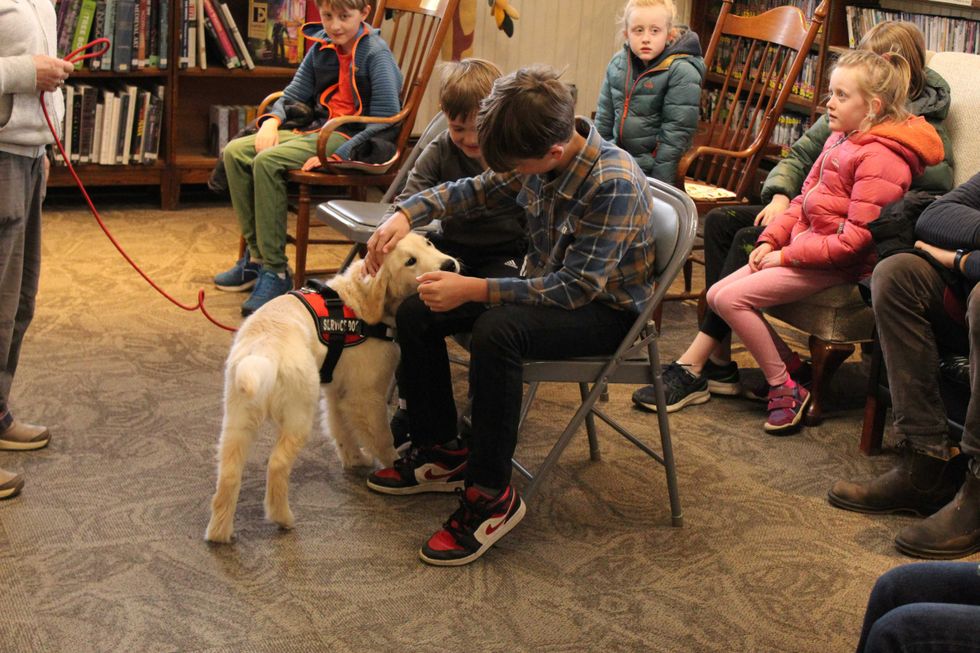
Vehicles of all sorts filled the downtown streets twice over the summer. The Falls Village Car and Motorcycle Show on July 13 attracted more than 600 entries and more spectators than ever, according to organizer Judy Jacobs.
And the vintage race car parade on Aug. 28 wound through Salisbury and Lakeville before finishing up in downtown Falls Village. Featured this year were vintage vehicles from the early 20th century, courtesy of the Rag Time Racers, a California-based group of race car enthusiasts specializing in very early vehicles.
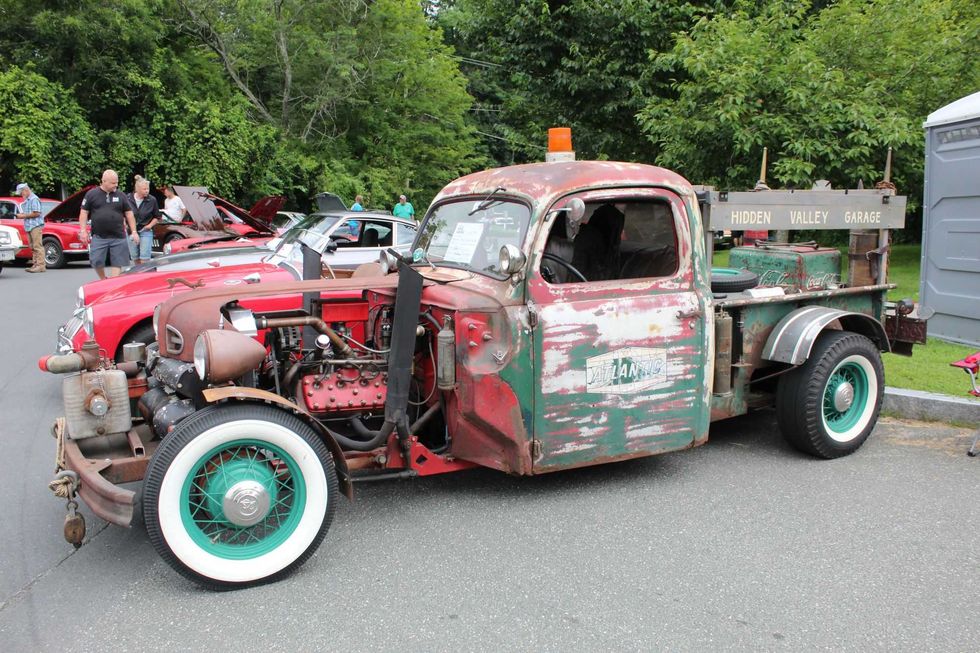
Over at Housatonic Valley Regional High School, work began on a “land lab” for the Agricultural Science and Technology Education Department when students cleared brush at the newly acquired, two-acre plot of open field and woodland a half mile up Warren Turnpike on Sept. 22. The area is planned to be a native forest management area meant to teach students about the health and maintenance of an ecosystem.
The Emergency Services Center hosted a special Planning and Zoning Commission meeting with the Falls Village Housing Trust and Habitat for Humanity on Nov. 5. The two housing groups provided an update on the status of affordable housing developments on River Road, with the Trust’s Jandi Hanna saying she expects to break ground in 2026. Bob Whalen of Habitat said his organization will be filing an application for either houses or duplexes some time in 2026.
Meanwhile, First Selectman Dave Barger responded to resident complaints about the town’s electric vehicle charging rates by pushing the device’s supplier for a reduction.
By the end of July, the price per kilowatt-hour had fallen from $1.45 to between 45 and 49 cents.